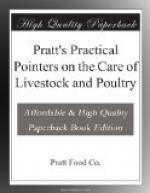If disease appears take instant action to check it. Delay of a day or two may permit an epidemic to get well started. In order to enable you to give proper treatment without delay you may well keep a stock of Pratts Poultry Remedies on hand.
[Illustration: APPLYING LICE POWDER]
Give every bird a thorough treatment for lice. Work Pratts Powdered Lice Killer all through the plumage. This will fix the lice, but will not kill the eggs. In anticipation of the latter hatching, rub Pratts Lice Salve in the small feathers about the vent and beneath the wings. That means death to the young lice as they appear, but to make sure, apply the salve at intervals of a few weeks.
Don’t overcrowd the house. Better have a hundred hens comfortable and laying than double the number crowded and loafing.
Leave all ventilating openings wide open. Keep them open until winter storms make more protection necessary. During the summer months the pullets have had plenty of fresh air. To bring them into a warm, tightly closed house is to invite general debility and an epidemic of colds, catarrh, roup and other allied diseases. (Pratts Roup Remedy dissolved in the drinking water every few days, especially during changes of weather, will help to prevent such troubles.)
Keep the house clean. Remove the litter from the floor as soon as it becomes damp or soiled and replace with new, fresh material. Clean the droppings boards at frequent intervals. Wash with Pratts Poultry Disinfectant or scald the food and water dishes. Disinfect the whole house every few weeks, taking advantage of sunny weather so quick drying will follow. Disease causes loss—disinfection prevents disease. Therefore, DISINFECT whether you see need of it or not.
Poultry Feeding
The more food the birds eat beyond bodily requirements the greater the amount of the salable products they create. Any hen that is a natural layer will turn the surplus food into eggs. If she is naturally a meat producer she will build flesh or take on fat. And the sooner the fat producers are identified and removed from the laying flock, the better for all concerned. Your birds will not “get too fat to lay”—they will get fat if they don’t lay. And the big problem is to induce the layers to eat as much food as they can digest in order that they may lay heavily and steadily.
To overcome all possible danger of overfeeding, Pratts Poultry Regulator should be regularly added to the mash. This natural tonic and conditioner contains appetizers, to stimulate the desire for food—digestives, to insure complete digestion and assimilation of the food consumed—laxatives, to regulate the bowels—internal antiseptics, to keep the entire digestive tract in a condition of perfect health—worm destroyers, to expel irritating and dangerous intestinal parasites.
Regularly used, Pratts Poultry Regulator insures freedom from the more common poultry disorders, reduces feed bills by preventing feed waste due to sluggish digestion, hastens growth, improves the egg-yield, shortens the molt, makes the entire flock more efficient, swells the profits.




